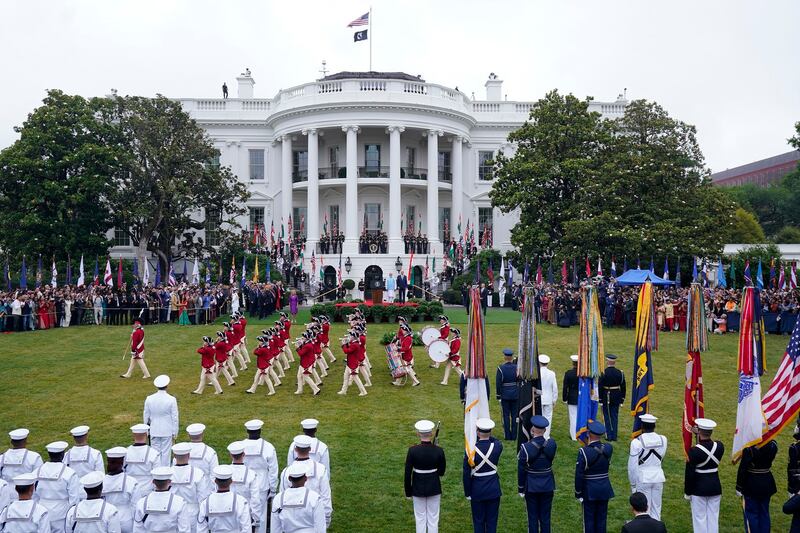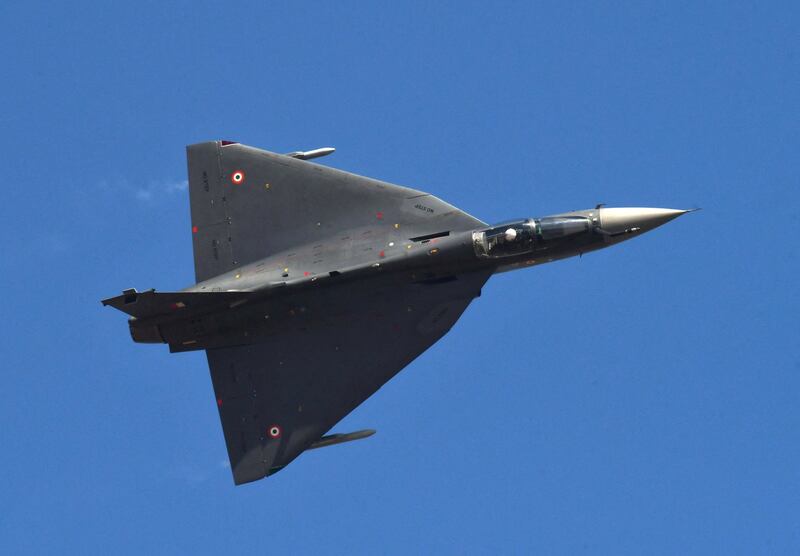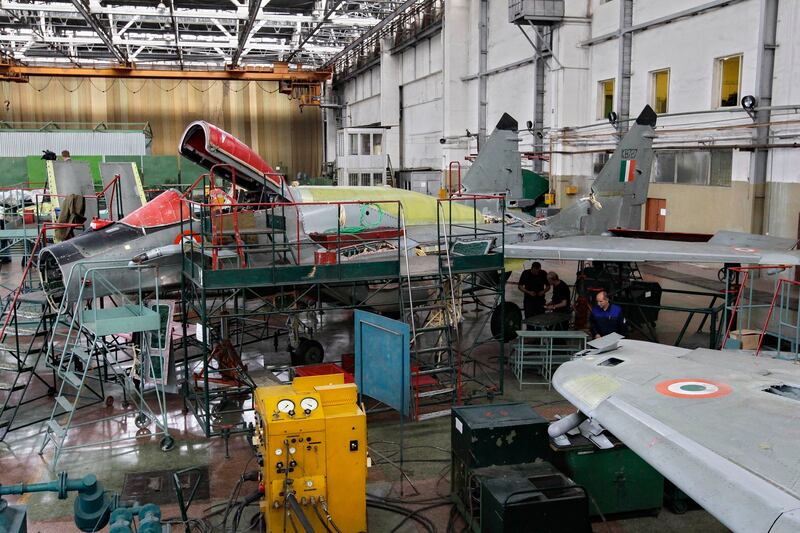Banned by the State Department from traveling to the United States until he became India’s prime minister in 2014, Narendra Modi was on Thursday ushered into the White House for the second time in as many years amid praise from U.S. President Joe Biden.
Standing next to Modi – who was denied U.S. visas over his role as governor in Gujarat's 2002 anti-Muslim riots – Biden said the pair were "trusted partners" who share the "core principles" of democracy.
“Welcome, Mr. Prime Minister. Welcome back to the White House,” Biden said. The meeting, he added, was happening at an “inflection point” in world history that was forcing their countries together.

For his part, Modi glossed over any bygones – and travel bans.
He had only seen the White House’s exterior when he traveled to the country “as a common man” 30 years ago. But not this time: “This grand welcome ceremony at the White House today,” the premier said, “is an honor and pride for the 1.4 billion people of India.”
“Thank you, Mr. President, for your friendship,” he added.
The specter of China
During the morning ceremony, neither Biden nor Modi betrayed the reasons for the embrace of their two countries.
But there were clues.
One was in the abundance of announcements that followed, headlined by a US$2.7-billion factory to be built in India by U.S. microchip maker Micron, which was last month banned from selling in China amid the ongoing chip war between Washington and Beijing.
There were deals, too, for General Electric to build fighter jet engines for India's military, as well as for the sale of Stryker armored vehicles and lightweight long-range howitzers, which India's military currently positions along its disputed Himalayas border with China.

China's specter was also present during an afternoon press conference at the White House, with Biden asked his views of Modi's crackdown on religious and media freedoms in the context of his recent public comments that Chinese President Xi Jinping is a " dictator."
“We're straightforward with each other and we respect each other,” Biden said of Modi, without answering the reporter’s question.
“One of the fundamental reasons that I believe the U.S.-China relationship is not in the space it is in with the U.S.-Indian relationship,” he said, “is that there's an overwhelming respect for each other.”
‘A pretty amazing transition’
The personal bonhomie between Biden and Modi marks a dramatic shift in relations between the countries, with New Delhi long skeptical of American foreign policy aims and one of the primary architects of the stridently neutral Cold War-era Non-Alignment Movement.
A socialist republic according to the preamble of its 1950 Constitution, India nonetheless long hewed closer to the Soviet Union. In fact, the historical ties between Moscow and New Delhi – and India's reliance on Russian-made weaponry – were widely seen as key to Modi's recent reluctance to isolate Russia amid its invasion on Ukraine.

But that has shifted as China – a historical rival of India, and one with which it shares a disputed 3,400-kilometer (2,100-mile) border – has supplanted Russia as the lead geopolitical rival to the United States.
“On security ties, we’ve really seen a pretty amazing transition in the last couple of decades,” said Richard M. Rossow, chair in U.S.-India Policy Studies at the Center for Strategic and International Studies.
Rossow said in a call last week to preview Modi’s visit that India’s longtime policy of nonalignment has over recent years “kind of shifted to language of strategic autonomy” and put an end to its historical reluctance to work too closely with the United States.
“That really is not exactly true when we focus on the main strategic threat that we both look at and share in the Indo-Pacific region, which is China,” he said. “We’ve found it relatively easy to open up doors that may have been closed 10-15 years ago.”
But that has not meant any alliances with the United States, with Modi at times warming to American advances when appearing threatened by China's growing power while thumbing his nose at other times.
“Trying to define what this relationship is,” Rossow said of U.S.-Indian ties, “is like crossing the river by feeling pebbles with your feet.”
Autonomous India
From Washington’s perspective, though, a stronger but fiercely independent India can still aid U.S. foreign policy objectives.
“As is well known in D.C. policy circles, India will never be a treaty ally of the United States,” explained Milan Vaishnav, a senior fellow at the Carnegie Endowment for International Peace and the director of its South Asia program. “However, U.S. strategists see India playing a central role in their larger framework of deterring China.”
Vaishnav told Radio Free Asia that even if they do not become official allies, “the United States and India view their futures as inextricably linked” on technology, defense and the broader economy, because India provides an alternative to China as a manufacturing base.
Amid U.S.-led efforts to " de-risk" supply chains away from a reliance on Chinese manufacturers, Vaishnav said, American officials are keen, in particular, to help India find "a foothold in the semiconductor market" and thereby establish a long-term alternative source market.
Rossow of CSIS said the same logic extended to India’s military and the need “to reduce reliance on Russia as a major military supplier.”
“We’re really trying to push the envelope … beyond what we’ve ever done for a country that’s not an ally” in terms of sharing military technology, he said, with an explicit aim of “helping India to become more self-reliant in some areas of weapons production.”

Speaking on the condition of anonymity on Wednesday evening, a senior Biden administration official also alluded to China as a key factor driving India closer to the United States militarily.
“I think some of the challenges that they faced along their own borders have concentrated their attention and caused them to focus intensively on both greater preparation on the defense side, and also seeking closer partnerships internationally,” the official told reporters.
The multipolar world
Ultimately, with India’s main priority to maintain its autonomy, playing off other world powers to its advantage is the aim of its game.
It's a foreign-policy shift that has been forged by Modi's external affairs minister, S. Jaishankar, a strategic realist who former U.S. Secretary of State Henry Kissinger singled out in an interview with The Economist as "the practicing political leader that is quite close to my views."
The author of the foreign-policy treatise " The India Way: Strategies for an Uncertain World," Jaishankar's view of the emerging world order is one defined by a multipolarity of four major powers – China, Russia, India and the United States, who can at best be "frenemies."
New Delhi won’t be constrained by any commitments to – or against – its “frenemies,” the minister has made clear. In the meantime, though, why not take what you can get without entering into alliances?
“We would like to have multiple choices. And obviously try to make the best of it,” he told The Economist. “Every country would like to do that. Some may be constrained by other obligations, some may not.”
Edited by Malcolm Foster
